#MING LIVES VERY SIMPLE QUIET LIFE for a hi-so kid
Text
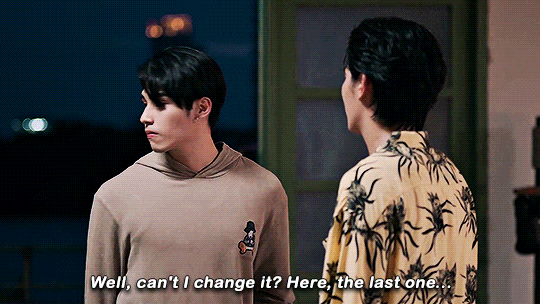
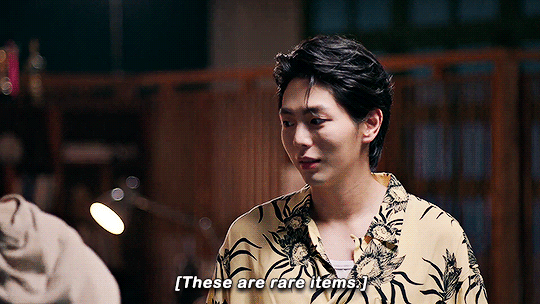
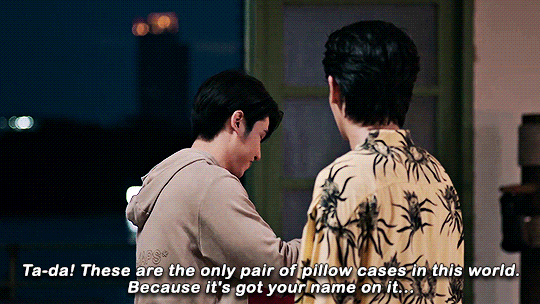
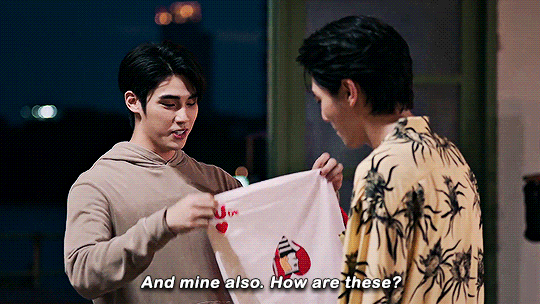
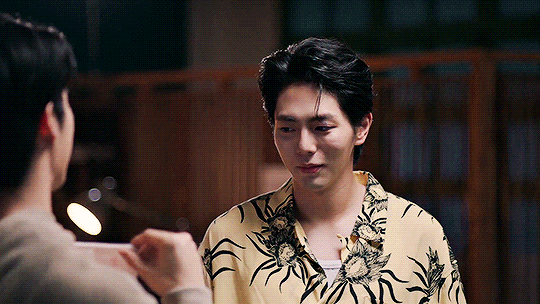
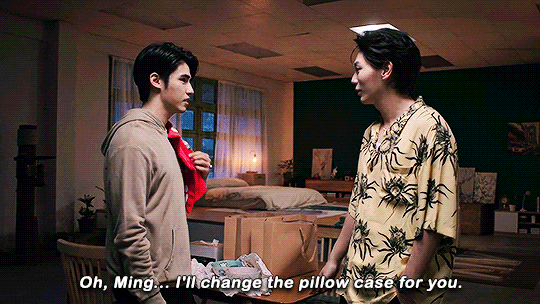
You bought so much. There are still a lot here at home.
MY STAND-IN (2024) | 1.03
#poom phuripan#up poompat#my stand in#my stand in the series#userbunn#userrain#usersasa#userjamiec#tobelle#msiep3#usertoptaps#tuseralexa#userrlana#userjap#rinblr#my stand-in#clairedgifs#msiedit#thaidrama#joe wanting to get new items for ming moving into his house#ming doesnt even want to spend bc he feels fine using stuff joe has at HOME#MING LIVES VERY SIMPLE QUIET LIFE for a hi-so kid
151 notes
·
View notes
Text
I think it's time to provide Ming Fei's childhood friend group lore! First up is Jessica.
Jessica lives a very simple, quiet life. Serial teacher's pet, she lives in a wealthy suburb. Her father is a single dad who's retired early and dreams of becoming a famous painter.



Heidi's life, on the other hand, didn't seem so simple.
Before she was born, Heidi's mother, Christy, was in a relationship going nowhere but the trashcan, and she was a criminal mastermind to pay the bills.

"I know...I didn't think I would get caught...we're holding out for the trial, right?"
Awaiting her trial, Christy gave birth to two beautiful children -- twins Heidi and Henri. The trial was going great...

...until it wasn't.

Christy still got to see her twins, Heidi and Henri, during visitation every now and then, but things weren't the same. The kids barely recognized her as their mother anymore.
While Christy was in prison, the twins lived with an auntie and cousin. Life there was good, but they still missed their mom, or the idea of her, at least.
A few years later, Christy's release day was on the horizon. Henri seemed to be fine minding his own business, working on cars at the local mechanic shop. Heidi on the other hand, was full of anger and rage. As a teenager, her lifetime want was to win 20 fights. Her cousin, Jojo, always tried to reassure her.

"There are better days ahead, Heidi. This could be your year!"
#Heidi Stratton#ts2 gameplay#ts2#ts2 simblr#the sims 2#sims 2#ts2 screenshots#sims 2 gameplay#sims 2 pictures
1 note
·
View note
Text
清和 (Qinghe) -- by 来自远方 (Lai Zi Yuan Fang) -- ch. 1
~
Author → here
JJWXC → here
Disclaimer & summary → here
Translated by me
Index of characters → here
~
Ming Dynasty, year thirty-one of Hongwu, Beiping-fu
The third month of the year[1] should have been a time when the lakes and rivers were warming up and the flowers began blossoming, but instead, Beiping saw several snowstorms. The frigid wind swept along a skyful of snow. Like a knife scraping the bone, gust by gust, it blew against one’s cheeks until they stung sharply.
Dressed in hemp with his hands stowed in his sleeves, Meng Qinghe was squatting by the door, staring blankly at the patterns on the door bolt.
Half-chi-long icicles hung from the eaves. The northerly wind swirled. The window frames made noises, as if it were knocking upon a person’s heart.
The old cat lying by corner stood up with a meow, stretching and then licking its paw. With a couple of jumps, it reached the surface of the simple and crude table upon which rested some brushes and paper, ink and an inkwell. Leaving behind a few paw prints on the yellowing paper, it shook its whiskers in joyful satisfaction.
In the past, Meng Qinghe would have definitely stepped over to chase it away, but in that moment, he was not in the mood.
“The Ming Dynasty, during the reign of Hongwu, Beiping-fu...good heavens, you’ve got to be kidding me...”
When a person got unlucky, even the water they drank would get stuck in their teeth[2].
He had just been walking down the street, nothing out of the ordinary. Even so he ended up traveling through time — and six hundred years at that!
Just how in the world did he time travel? Was there a problem with the way he walked?
“How great would it be if this were a dream,” Qinghe gave his head a hard scratch, dejected and also helpless.
If he had known, he would rather have sold his body to entertain the masses by grabbing a pole and dancing the hula at his company’s annual dinner than sneaking out early.
What a shame that wishes were wonderful but reality was so often incomparably cruel. Cruel, just as the northerly wind blowing on him through the door crack.
Sigh...
His loose long hair flew. The hemp sack of a robe he was wearing might as well have not even been there.
It was so cold his teeth chattered. Rubbing his arms, Qinghe gritted his teeth. He was already here and his chances of returning to his time were slim to none. Even if he regretted things to the moon and back, it was futile. What he should be thinking about was how to keep living.
He did not require much much: three meals a day, a standalone house, no worries over food or clothing — that’d be enough.
Lacking in ambition? A good man not striving to accomplish things and win all the ladies?
He’d ask such a doubter to open their goddamn eyes. This was the reign of Hongwu. Beiping-fu was the Prince of Yan’s territory. Wanting to overflow with boldness in the presence of the likes of Taizu and Chengzu of Ming? Were they tired of how long their life was lasting?
As for winning all the ladies...sorry, he preferred men.
Undertaking heroic ventures and snatching up a beautiful woman might be a story to capture the imagination, but snatching up a man...well, better to forget about it.
Qinghe wiggled his fingers and pushed at the glasses that no longer rested on the bridge of his nose. As dictated by his profession, no matter what it was that he was going to do, he liked to lay out plans beforehand.
Right then, being a civil servant was a high risk job. The higher the position, the higher the likelihood of one’s head and neck taking their leave. The Hongwu Emperor’s bureaucratic reforms abolished the post of Grand Chancellor as well as the Six Ministries. On top of that, he set the record of ordering the execution of ten zu[3]. Jianwen Emperor, his grandson, was relatively good-natured, only intending to target his uncles. However, as it turned out, Jianwen’s military prowess was lacking and he would be usurped by one such uncle. Very few of the ministers who were adamantly loyal to him met a good end.
Thus, it was abundantly clear that taking the imperial exam to become a government official was not a viable path.
Becoming a merchant was also not a good way forward. For specifics, one could refer to the tycoon Shen Wansan, who loved to help others but who was sent away to Yunnan[4] by the Hongwu Emperor to experience life in the army.
Being a good, poor farmer was undoubtedly relatively safe, the prerequisite being that one did not encounter a year of calamities or run into a local tyrant or nasty member of the gentry with too formidable of a personal background.
Other than that, there was another path: enlisting in the military.
However, taking into account his actual situation, this matter was one that he needed to consider at greater length.
A noise sounded again from behind him. Qinghe turned his head to look at the old cat on his table, his lips cracking apart as he bared his teeth at the animal.
With his hair disheveled and a predatory glint in his eye, his thin face was exceptionally malevolent.
Meow!
The old cat bristled, leaping instantaneously from the table onto the roof beam.
Qinghe gave his hair a sassy flip. A perfect victory.
The satisfaction of a victory lasted all but two seconds before sorrow took its place. Gazing at the old cat that was chasing a mouse up on the roof beam, he was infinitely sad that even a cat was happier than him.
At least the cat could eat meat; he could not.
“Shi’erlang[5].” As he was drowning in the clutches of his sorrow, a quiet, hoarse call came from outside the door.
Qinghe did not respond. After a while, another quiet call came, peppered with coughing. No matter how hard his heart of stone was, he could not go on pretending that he had not heard.
Standing up, he shook out his limbs, an action of necessity due to the fact that he was frozen stiff.
Unbolting the door, he saw three haggard women dressed in hemp[6] standing outside. The one in the middle being supported was his mother. The other two supporting her were his older brothers’ wives.
“Mother, saozi[7].”
Going by the memories in his head, Qinghe bowed in greeting, letting the three of them into the room. When he had first arrived in this time period, the boy who was also named Meng Qinghe had already been gravely ill and soon breathed his last. The odd thing was, the memories of this body’s previous owner had remained in Qinghe’s mind.
“Shi’erlang, your datangbo[8] genuinely does not want us to live!”
His mother Meng-Wang-shi[9] coughed twice for each sentence she spoke. As for his sisters-in-law, Meng-Xu-shi and Meng-Zhang-shi, one stroked his mother’s back to ease her breathing while the other was busy consoling her. Their faces were pale and angry and helpless.
Their father-in-law was gone. Their men were also gone. Their xiaoshu[10] Meng Qinghe was only fourteen. What could he really do?
After listening to his mother’s lament, Qinghe’s brows also knotted together.
“What sweet words! ‘Lending a hand’, he says! He’s just scheming to get his hands on our measly family property!” Meng-Wang-shi took Qinghe’s hand in her own, her voice hoarse. “In order to pay for your father and your two brother’s funerals, we barely have anything left anyways! And now, he’s set his sights on even this...”
As she spoke, tears streamed down her face. “When your father and your brothers were alive, whenever something came up in the clan, we never denied them anything. To think their graves are not even cold yet and already your datangbo has turned hostile and is pushing us to the point of death! The fields that we sold, whose hands are they in now? And who took our ox that we used to plow the fields? And why did the teacher drive you out of school and back home? We all have Meng as our family name. How can he go so far? Does he not fear divine retribution?”
The more she spoke, the more stirred up her emotions became. Her wan face bloomed with pink and her coughing grew worse.
Before she finished her words, a cough sounded abruptly from outside the door. Qinghe looked over to find a short and stout man dressed in a dust-gray round-collared cotton padded jacket. The man’s face appeared simple and honest but his eyes carried a shred of shrewdness. It was his datangbo, Meng Guangxiao.
“Datangbo.”
Before Meng Guangxiao could open his mouth, Qinghe made his salutations and invited the man inside. After greeting him, Meng-Wang-shi sat to the side without a word. Qinghe’s two sisters-in-law stood behind Meng-Wang-shi with their heads slightly lowered, also keeping silent.
Meng Guangxiao indicated to Qinghe that there was no need to be so courteous. His tone was kind, as if he were genuinely a good-natured elder.
“Your father and brothers are gone. Your mother and sisters-in-law are women. You are still young. Whatever you need help with, I will not say no.”
Qinghe raised his clasped hands[11] and bowed deeply. “Thank you, datangbo.”
Gestures dictated by the etiquette of the ancients were still awkward when he performed them. Good thing most verbal communication consisted of vernacular language and not filled with archaic expressions. Otherwise, it was bound to induce a headache, no matter who was on the receiving end.
“However,” what Meng Guangxiao was saying took a turn, “Good nephew, you’ve seen the weather at the start of this year. After all these snowstorms, the springtime field-plowing will probably be delayed.”
Qinghe did not pick up the thread of conversation, not that Meng Guangxiao minded. He carried right on speaking. His words were not harsh but the meaning was clear: the weather at the start of the year was poor and everybody was having a hard time. Your family might be facing difficulties but nobody else was well off either. So should you not be repaying the money and food you had borrowed earlier?
“Putting others aside for now, your ertangbo’s family just added an extra member. He has a hard time saying the words so I have to play the part of the bad person,” Meng Guangxiao paused. “You know I have no other options.”
“Indeed,” Qinghe agreed readily, seemingly completely unaware of what Meng Guangxiao was up to. After a moment, a bit of an ashamed blush crept up onto Qinghe’s face, as if he had just recalled that there was no food at home. “Right now, we are truly in quite a predicament. Could I ask for a few more days?”
“Oh?”
“In a few days, I will definitely come up with some way to scrape together the money and the food. I will not make things difficult for you, datangbo.”
Meng Guangxiao eyed the boy suspiciously. He knew how things stood with this family. Ever since he was little, Meng Qinghe had had his nose buried so deep in his studies that he ended up growing into an otherwise clueless fool. After Meng Guangzhi and his two sons died, there was nobody else who could take charge of the household. Three funerals had exhausted pretty much all of their wealth, leaving behind a family of widows and orphans, guarding a big house and several mu of farmland. If it were not for the fact that he had his eyes on those three mu of top quality farmland and this house, Meng Guangxiao would not drop by so often, risking having all this bad luck stick to him for no reason.
It had yet to be twenty-seven days since the funerals. Ordinarily, Meng Guangxiao should have been in the mourning garment xiaogong[12] for his cousin. At worst, he should have been in dressed in sima. No matter how nice his words were, him paying a visit in his gray, cotton padded jacket showed that he placed no importance upon this family of widows and children.
So the saying went: one would be better off looking down on an old man with white hair than a youth in poverty.
One could look with disdain upon the enemy but should not view an opponent lightly.
Meng Guangxiao had committed both errors. To put it bluntly, it was going to serve him right to fall flat on his face at Qinghe’s hands.
“Datangbo, there are still a few mu of farmland and a house in my family’s possession. Once I find an intermediary to evaluate the price and manage to sell them, I should be able to repay some of the debt.”
Qinghe had carefully deliberated the words that made him want to wince and he barely avoided biting his tongue in the process of delivering them. Given that he wanted to dig a hole for Meng Guangxiao to jump into, his “act” had to be convincing. He was an expert at this sort of thing.
Meng Guangxiao barely kept down the rising corners of his mouth, but he was unable to disguise the contempt in his eyes. His oldest son’s earlier concerns were unnecessary after all, concerns about how shi’erlang was extremely intelligent to the point of not appearing so on the surface[13] and to not coerce him, lest it ruin the amicability between both families. As it were, this boy was but a fool.
But it was a good thing that he was a fool!
After sending Meng Guangxiao off, Meng-Wang-shi, who had kept her silence, tugged on Qinghe’s garment, her voice trembling: “Oh son, what has happened to you? How come you...”
What she wanted to say was: ‘Oh son, how come you have lost it? Why fall for the trap in a one-track minded fashion when you clearly know he covets our property? Besides, that bit of paper money that Meng Guangxiao, Meng Guangshun, and the others had lent us has already been taken back by them many fold through the sale of our fields. Moreover, they pocketed a significant amount during the planning of the funerals. Now, they dare to use this as an excuse to coerce us!’
Meng-Xu-shi and Meng-Zhang-shi’s expressions also showed confusion and reproach. If the remaining land and house were sold off, what were they, as a family, going to eat? Where were they going to live?
“Mother, do not worry.” Qinghe, on the other hand, was the image of ease. Helping Meng-Wang-shi rise to her feet, he spoke in a resolute tone: “Rest assured that I have a plan.”
They wanted his family’s land? He would give it.
They also wanted his family’s house? He would give that as well.
Them laughing at him for being a fool? Then let him be one.
Being a fool was a good thing. If a fool took things a little too far and acted outside the realm of normal logic, nobody would be able to really take issue with that, right?
Qinghe smiled. Meng-Wang-shi did not notice but Meng-Xu-shi and Meng-Zhang-shi exchanged a look, each with an expression showing the same befuddlement. Did xiaoshu just smile? And an eerie smile at that...
~
Chapter 2 ▶
~
T/N:
[1] This refers to the third month of the Chinese lunar calendar, which is the month following the spring equinox.
[2] This is a common saying about misfortune.
[3] Warning for violence in this note!!! In ancient times, family members often paid for the crimes of their (sufficiently close) relatives. The harshest punishment before executing ten zu was executing nine zu, considered as the eradication of an offender’s lineage. According to Baidu Baike, these nine included four on the father’s side (one’s family, those of one’s married paternal aunts, those of one’s married sisters, and those of one’s married daughters), three on the mother’s side (that of one’s maternal grandfather, that of one’s maternal grandmother, those of one’s married maternal aunts), and two one the wife’s side (that of one’s father-in-law, that of one’s mother-in-law). The tenth zu was one’s students.
Absolutely gruesome, yes, but that was what it was, the harshest capital punishment meted out. Just explaining this to drive home the point of what Qinghe, as a modern day person, knew of the Hongwu Emperor.
[4] Yunnan province, back then, was considered quite remote for the Han Chinese. And also, as it remains today, Yunnan was home to many ethnic minorities. Read: conflicts.
[5] Shi’erlang is literally “twelfth young man”. Sons were referred to as *insert number* young man, with the number corresponding to their age ranking within the family. In this case, no, Qinghe’s mom did not have twelve boys. It refers to him being the twelfth oldest of his generation within his clan.
[6] This is the second occurrence of the word hemp so I guess I should belatedly explain: white clothes made of hemp were worn in mourning.
[7] Saozi is how one calls one’s older brother’s wife. To note, though it is so in Qinghe’s case, it does not have to be one’s older brother by blood. Nowadays, it doesn’t even have to be legally such a brother’s wife.
[8] Bo is a paternal uncle who is older than one’s father. Tangbo is such an uncle who is a paternal cousin of one’s father. Da indicates this uncle is the oldest of such a generation in the family. Er (2), san (3), si (4), etc would label the subsequent such uncles.
[9] Taking Meng-Wang-shi as an example, this was how married woman were referred to back then, in the format of X-Y-shi, wherein X = the surname of her husband and Y = the surname of her father. They were rarely addressed by first names, as that was considered intimate.
[10] Xiaoshu is how one calls one’s husband’s younger brother.
[11] This was a gesture of respect.
[12] Of the traditional wufu or five mourning garments, whether one wears the zhancui, qicui, dagong/dahong, xiaogong/xiaohong, or sima (in order of coarseness of the fabric) depended upon the closeness of one’s relation to the deceased. Sima had the finest weave and were worn by the most distant of relatives that needed to wear mourning garments.
[13] This is an idiom, one of several of opposites originating from the works of Lao-Tzu. It means that the truly intelligent are so different from the average person that their actions fail to be understood, thus appearing stupid.
1 note
·
View note
Text
Supporting students in Puerto Rico after a hurricane’s devastation
When Hurricane Maria hit Puerto Rico in September 2017, Héctor De Jesús-Cortés was vacationing on the island with his wife, Edmarie Guzmán-Vélez. “Worst vacation ever, but it actually turned out to be the most important in my life,” says De Jesús-Cortés. In the days immediately after the hurricane, both focused on helping their families get their bearings; after that first week, however, they were itching to do more. That itch would take them to San Juan, Puerto Rico’s capital, where they asked the then-secretary of education a simple question: “How can we help?”
With De Jesús-Cortés’ PhD in neuroscience and Guzmán-Vélez’s PhD in clinical psychology, they soon became involved in an effort led by the Department of Education to help students and school staff, as well as the community at large, troubled by the hurricane. “Everyone was traumatized, so if you bring kids to teachers who are also traumatized, that’s a bad recipe,” explains De Jesús-Cortés.
De Jesús-Cortés and Guzmán-Vélez connected with their friend Rosaura Orengo-Aguayo, a clinical psychologist and assistant professor at the Medical University of South Carolina who studies traumatic stress and Hispanic populations. Working together with the Department of Education and the U.S. Department of Health and Human Services, they developed a program to address trauma in schools. The Esperanza, or “promise,” program is ongoing and has already trained hundreds of school staff members on how to manage trauma and anxiety, and to identify these manifestations in students.
Back in Boston, De Jesús-Cortés has continued his efforts for Puerto Rico, raising funds for micro-entrepreneurs and teaching neuroscience in online classes for undergraduates on the island. Each effort is guided by that same simple question — How can we help? His latest effort along with Guzmán-Vélez is a precollege summer program at MIT that will give Puerto Rican students a taste for scientific research.
A sense of possibility
For De Jesús-Cortés, teaching is more than just a transfer of knowledge. “I see teaching as mentorship,” he says. “I want students to be exposed to opportunities, because growing up in Puerto Rico, I know how difficult it can be for some students to get those opportunities.”
While De Jesús-Cortés was an undergraduate at the University of Puerto Rico, he participated in Minority Access for Research Careers (MARC), a National Institutes of Health-funded program that supports underrepresented minority undergraduates as they move toward careers in biomedical sciences. “We had workshops every month about applications; they would bring recruiters, and they would also pay for summer internships,” explains De Jesús-Cortés.
MARC allowed De Jesús-Cortés to see a career in science as a possibility, and he envisions that the summer school, whose inaugural class will be in summer 2020, will do something similar. “The idea is to have kids first spend two weeks in Puerto Rico and expose them to research at the undergraduate level,” explains De Jesús-Cortés. The students will be at the Universidad del Sagrado Corazón in Puerto Rico; the university has partnered with De Jesús-Cortés on the project. “Then they travel to Boston and see what research is happening here.” The 15-20 students will spend two weeks in Massachusetts, living in the MIT dorms, visiting labs, and learning how to apply to colleges in the United States.
The MARC program also gave De Jesús-Cortés a community. “To this day, I talk to my MARC fellows,” he says, and that’s something he hopes to replicate with the summer students. “Each student will have a mentor, and I want them to keep talking after the program,” De Jesús-Cortés says.
The summer school will not just give students a taste of scientific research, it will also show that universities like MIT are within their reach. “I was born and raised in Puerto Rico, and my schools didn’t have the best resources in STEM,” De Jesús-Cortés says. He hopes that, by seeing researchers in Greater Boston that have the same background, the summer students will see MIT and a career in science as a possibility. “Students need to be exposed to mentors and role models that prove that it can be done,” he says.
Fixing vision
De Jesús-Cortés works on the summer school, and his other efforts for Puerto Rico and the Latino community, in addition to his neuroscience research. As a postdoc in the lab of Mark Bear, the Picower Professor of Neuroscience, he’s trying to use electrophysiology to figure out when neurons in the brain need a little help to communicate.
Neurons communicate with one another using both chemical and electrical activity. An action potential, which is electrical, travels down the arms of the neuron, but when it reaches the end of that arm, the synapse, the communication becomes chemical. The electrical signal stimulates the release of neurotransmitters, which reach across the gap between two neurons, stimulating the neighboring neuron to make its own action potential.
Not every neuron is equally capable of producing action potentials. “In a neurodegenerative disorder, before the neuron dies, it’s sick,” says De Jesús-Cortés. “And if it’s sick, it’s not going to communicate electrically very well.” De Jesús-Cortés wants to use this diminished electrical activity as a biomarker for disorders in the brain. “If I can detect that diminished activity with an electrode, then I can intervene with a pharmacological agent that will prevent the death of neurons,” he explains.
To test this, De Jesús-Cortés is focusing on amblyopia, a condition more commonly known as lazy eye. Lazy eye happens when the communication between the visual cortex — a region in the back of the brain where visual information is received and processed — and one of the eyes is impaired, resulting in blurred vision. Electrical activity in the visual cortex that corresponds to the lazy eye is also down, and De Jesús-Cortés can detect that decreased activity using electrodes.
When amblyopia is caught early on, a combination of surgery and an eye patch can strengthen the once-lazy eye, getting rid of the blurriness. “But, if you catch that condition after 8 years old, the patching doesn’t work as well,” says De Jesús-Cortés. Another postdoc in the Bear Lab, Ming-fai Fong, figured out that tetrodotoxin, which is found in puffer fish, is able to reboot the lazy eye, bringing up electrical activity in the visual cortex and giving mice with amblyopia perfect vision mere hours after receiving a drop of the toxin.
But we don’t actually know how tetrodotoxin is doing this on a molecular level. “Now, putting tetrodotoxin in humans will be a little bit difficult,” says De Jesús-Cortés. Add too much toxin and you could cause a number of new problems. He is investigating what exactly the toxin is doing to sick neurons. Using that information, he then wants to design alternative treatments that have the same or even better effect: “Find neurons that are quiet because they are sick, and reboot them with a pharmacological agent,” he says.
In the future, De Jesús-Cortés wants to look beyond the visual cortex, at other regions of the brain and other conditions like Parkinson, Alzheimer’s, and autism, finding the hurting neurons and giving them a boost.
In both his neuroscience research and his work for Puerto Rico, De Jesús-Cortés is passionate about finding ways to help. But he has also learned that for all these efforts to succeed, he needs to accept help as well. “When you are working on so many projects at the same time, you need a lot of different people that believe in your vision,” he says. “And if you’re helping them, you believe in their vision.” For De Jesús-Cortés, this reciprocity is one of the most important aspects of his work, and it’s a guiding principle in his research and life. “I believe in collaboration like nothing else.”
Supporting students in Puerto Rico after a hurricane’s devastation syndicated from https://osmowaterfilters.blogspot.com/
0 notes